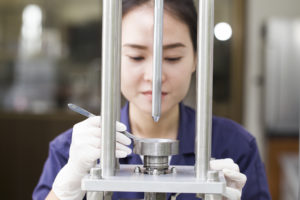As part of the commitment of Philadelphia’s String Theory Schools to cultivate an educational environment where students become the world’s next creative leaders, String Theory is now looking to ensure students have the opportunity to advance in studies beyond high school. A fully STEM + Arts program where students select majors starting in middle school, the plan is to expand education during high school years to provide college courses available in their same school environment.
Jason Corosanite, Co-founder and Chief Innovation Officer of String Theory, announced the development of ”String Theory U”, a post-secondary school which will offer 400-hour diploma based programs in high demand areas such Computer Science, Biotechnology, and Nextgen prototyping & design. “The school will ultimately mature into a four-year degree-granting institution” Corosanite said.
String Theory is applying to the PA. Dept. of Education and the Middle States Association of Colleges and Schools to develop these programs, and they would be open to current students enrolled at String Theory-managed schools with the hope of offering college credit to students at other area high schools at no-cost/low cost. The first program will be offered later this year at String Theory’s Vine St. campus.
According to Corosanite, “It’s the next logical step going from high school to college and career.” He continued, “Our vision is to complete the pipeline for kids throughout their education and to develop a 21st Century workforce. And what sets this apart from other early college/middle college programs is that we will develop our own post-secondary institution. Traditional high schools must partner with area colleges and typically with significant costs. Technology is also evolving so quickly that many colleges fail to adapt fast enough to start-up trends. By having our own accredited programs, we’ll be able to make sure that college moves at the speed of innovation.”
A pioneer in progressive education since the opening of its flagship high school in 2013, this fall String Theory launched Particle, a new type of co-working opportunities in space in String Theory Schools’ Vine Street location. Particle serves as a home to local start-up businesses and student-run companies. Structured as a fellowship, companies use the space for free while utilizing the skills of talented String Theory students to complete design projects. Students in high school have internship programs right there in school by working with a diversified group of businesses and organizations.
And, in addition to providing learning opportunities for students, companies also have access to facilities in the school including a biotechnology lab, motion capture studio, engineering & robotics lab, a 200-seat state-of-the-art theater, TV and broadcast production facilities, a YouTube kitchen studio/food lab, and much more. Preparing students for the job market while studying in high school, and soon college, String Theory’s education programs place great value in entrepreneurship as a fundamental aspect of innovation.
With the option to take college accredited classes, Corosanite sees this as the natural extension of the college-attendance culture of their school. “We are very proud that last semester we had our first class of 12th grade students, and that a portion of our first graduation class, 79 students, received $12 million in scholarships. This year we have about 120 students dual enrolled in college. With this in mind, we see String Theory U as an important part of our future.”
The vision of String Theory Schools is to provide the opportunity for students to explore their interests in the arts, language, science and/or technology that will prepare them for a faster entry into related occupations through a proven model of excellence. The vital components to the String Theory education are for students to hone the ability to create and to be creative, to inspire and to be inspired. String Theory Schools aim to offer life experience, academics, and the arts, forming a well-rounded educational approach and by continuing this in post-secondary education would be the ideal continuation of their 21st Century form of education.
About String Theory Schools:
String Theory Schools is a tuition-free charter school offering a STEAM curriculum – science, technology, engineering, arts and math. With the unique blending of academic and artistic excellence, students are constantly involved in innovative thinking and problem solving with the goal of creating the next generation of creative leaders. The largest charter school in Philadelphia, String Theory operates two schools with a total of 3500 students on four campuses. Three locations make up Philadelphia Performing Arts (K to 12), and one campus is The Charter School for Arts and Sciences (K to 8). The four campuses are located at: Performing Arts East Campus (K to 1), 2407 S. Broad Street, Philadelphia, PA 19148; Performing Arts West Campus (2 to 4), 1600 Vine Street, Philadelphia, PA 19145; Performing Arts Vine Street Campus, (5 to 12), 1600 Vine Street, Philadelphia, PA 19102; and, Arts & Sciences Campus, (K to 8), 1197 Haworth Street, Philadelphia, PA 19124. For further information, visit www.stringtheoryschools.org or call (267) 428-2224.
Material from a press release was used in this report.
- Chief Releases Fit Mobile Cart for Interactive Displays - May 6, 2024
- Higher Ed Tech Innovation News - April 25, 2024
- How is Technology Used in Higher Education? - April 25, 2024

